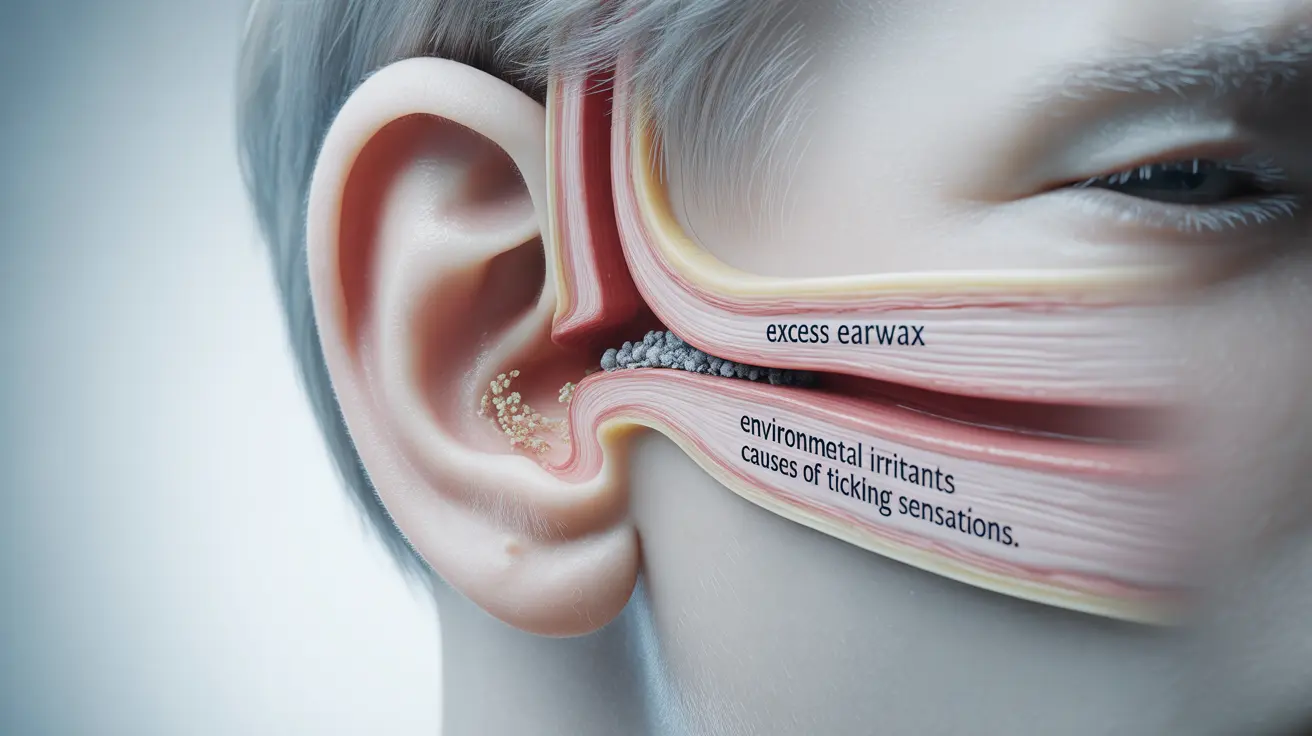Experiencing a tickling or crawling sensation in your ear can be both uncomfortable and concerning. This peculiar sensation, while usually harmless, might indicate various underlying conditions that deserve attention. Understanding the causes and knowing when to seek medical help can help you manage this sensation effectively.
In this comprehensive guide, we'll explore the common causes of ear tickling sensations, treatment options, and important warning signs that indicate when professional medical attention is necessary.
Common Causes of Ear Tickling Sensations
Several factors can contribute to that annoying tickling or crawling feeling in your ear:
Earwax Buildup
Excess earwax is a frequent cause of tickling sensations in the ear. While earwax naturally protects your ear canal, too much accumulation can create unusual sensations and even affect your hearing.
Environmental Irritants
Dust, pollen, or small debris entering your ear canal can trigger tickling sensations. These particles often cause temporary irritation and may resolve on their own.
Infections and Allergies
Both ear infections and allergic reactions can cause inflammation in the ear canal, leading to tickling or crawling sensations. These conditions often come with additional symptoms like itching, pain, or discharge.
Safe Management and Treatment Options
Professional Ear Cleaning
If excess earwax is causing the tickling sensation, consider visiting a healthcare provider for professional cleaning. They can safely remove buildup using specialized tools and techniques.
Home Care Guidelines
While managing ear discomfort at home, remember these important points:
- Never insert objects into your ear canal
- Use over-the-counter ear drops only as directed
- Keep ears dry during bathing or swimming
- Avoid excessive cleaning that might irritate the ear canal
When to Seek Medical Attention
Certain symptoms warrant immediate medical evaluation:
- Persistent tickling sensation lasting more than a few days
- Accompanying pain or discharge
- Hearing changes or ringing in the ears
- Dizziness or balance problems
- Signs of infection like fever or severe discomfort
Prevention Strategies
To minimize the risk of developing tickling sensations in your ear:
- Protect your ears from excessive water exposure
- Use ear protection in dusty environments
- Maintain proper ear hygiene without over-cleaning
- Address allergies promptly with appropriate medications
Frequently Asked Questions
What causes a tickling or crawling sensation in my ear?
Tickling or crawling sensations in the ear can be caused by excess earwax, foreign objects, infections, allergies, or environmental irritants. These sensations might also occur due to nerve irritation or changes in air pressure.
How can I safely treat earwax buildup that causes itching or tickling in the ear?
Safe treatment options include using over-the-counter ear drops designed for wax removal, seeking professional cleaning from a healthcare provider, or using gentle irrigation methods recommended by your doctor. Never insert objects into your ear canal to remove wax.
When should I see a doctor for a crawling or tickling feeling in my ear?
Consult a healthcare provider if the sensation persists for more than a few days, is accompanied by pain, discharge, hearing changes, or fever, or if you suspect a foreign object in your ear.
Can allergies or infections cause a tickling or tingling sensation in the ear?
Yes, both allergies and infections can cause tickling sensations in the ear. Allergies may cause inflammation and irritation, while infections can lead to similar sensations along with other symptoms like pain or discharge.
What should I do if I feel a bug or foreign object crawling inside my ear?
If you suspect a bug or foreign object in your ear, remain calm and seek immediate medical attention. Do not attempt to remove it yourself, as this could cause injury. Tilt your head to the affected side to encourage the object to fall out naturally, but if it doesn't, let a healthcare professional remove it safely.




